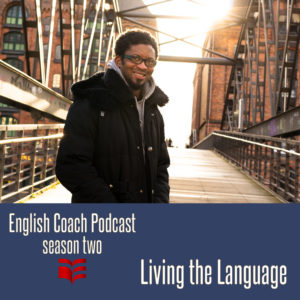Episode 26 – The aim of this podcast is to help you to quickly improve your vocabulary and fluency without too much work.
Shownotes: English Coach Podcast – Living the Language
| Apple Podcasts | Spotify | Google Podcasts | Amazon Music | YouTube | Local Player |
All of these exercises that I’m sharing with you today 1 to 5, will help you to optimise your approach – to training your brain to think in English. By the end of this short episode you will have been given proven tools that help. Why proven? The exact same tools have worked for me too. Quickly in German: Am Ende dieser kurzen Episode werden Sie bewährte Hilfsmittel erhalten haben, die Ihnen helfen. Warum bewährt? Genau dieselben Werkzeuge haben auch bei mir funktioniert.
ANNOUNCER
Well hello there, welcome to Episode 26 of the English Coach Podcast – tsecond in Season two – and the first of what I like to call mini-lessons – it’s more of a coaching encounter to be more precise. This is by no means a formal lesson – There is another place for that – if you are interested in finding out what formal training or coaching solutions are available to you – just head on over to TrainingTree.de and use the contact form. I’m happy that I finally got to launching Season Two – I threatened to do this in Episode 24, and here I am. Regardless of the crisis. The question was asked by an old friend of mine once – Johanna – as to who exactly the show is for. It’s for you since you’re here, but if you need a little more insight into that – all in German – check out Episode 25 – The Launch of Season Two.
Now I know nothing about meditation – But I know how to close my eyes. I know how to free my mind of all distractions – take a few deep breaths – exhale – and open them again. You can do that too any time…. Now you try to do the same thing, and as soon as you open your eyes try to think of the English word for everything that you see.
This is the FIRST stage of this exercise that will help you. It works, and it helped me as an adult learner of German as a foreign language – I started learning German at 28.
You can do this at any time, and if you have a vocabulary notebook just write the words down also in your own language to look up them later if you must. Just look around – Book, carpet, pen, headphones, lamp, chair, work desk, window, box, door, cardboard-box, masking tape, umbrella, pencil, jacket.
Write down as much down as you can, this will get easier as time goes along, and think of all of these things as being as important in English, as they are in your own language.
There are tonnes of things – just keep it short and keep it simple. You can even make it a little more interesting by focusing on nouns one day and then verbs, then adjectives and adverbs – words you use to describe nouns and actions –check the shownotes for definitions.
Just vocabulary. This is something that you can do any time. At home, at work, while traveling, while going for a walk anytime and anywhere. Just ask yourself the question “How would I say that in English?”
How WOULD you say that in English?
That leads us to the SECOND stage of this exercise. Using the same technique, call it a pause, meditation or just taking a deep breath – anything that will easily get you into the mode for learning. Some people need a little more ritual as a trigger – so to speak, some people need less. It doesn’t matter. The aim here, is to make a note of key phrases and simple sentences – and you start by simply asking yourself the question “How would I say that in English?”
These key phrases and simple sentences will be different for different people – depending of course also on the reason why you are learning English in the first place. As an adult learner of English, your reason is important to you, and that’s also a bit of reflection that you should do from time to time. We are all adults here, and it’s no secret that different people learn – and invest time or money in learning a language for a whole host of different reasons – ranging from learning pickup lines for boys or for girls – to preparing for a vacation – to preparing for a job interview, for hosting an international conference or for taking part in a political debate – This is where customised training and coaching comes into play. What would be your reason for learning?
For a Business English Learner for Instance – a simple work related key phrase could be – on the telephone – Quickly in German:
„Guten Tag, Schmidt mein Name, ich hätte gern die Frau Müller gesprochen bitte.“ That could be:
„Hello my name is Schmidt, I’d like to speak to Ms Müller please.”
You’ll note there that I said Ms and not Miss or Mrs. Sybille von Spitzen sagt: That’s more about Political correctness, Knigge or simply a more modern form of address. You’ll also notice that I didn’t translate their names into any strange twang. Sybille von Spitzen sagt and I quote – “I think that it’s rude and presumptuous to attempt to translate people’s names – English might be a global standard of sorts but not for everything everywhere – You don’t want to offend anybody in Business relationships, and while people might forget, and forgive the way you say something, they won’t so easily forget the way you make them feel. Try to use the correct pronunciation for names – or find a way to gracefully apologise for the version you are capable of.” End of quote.
OK Sybille von Spitzen for you again – that might actually be a topic for another show.
For a General English learner – perhaps learning English for a vacation or just for socializing in an international crowd:
You could say: “Hello, my name is Ian, Ian Antonio Patterson – you should know me.” No, just kidding, better not say that.
Just say: „Hello, my name is Ian, I’d like to introduce myself.”
Another thing you could say, having to do with money this time – Quickly in German:
„Haben Sie fünfzig Euro Wechselgeld?“ That is:
“Do you have change for a fifty?”
You could also say:
„Wie komme ich zum Bahnhof?“ That is:
“How do I get to the train station?”
Simple phrases, little things like that – that have – you could say they have a specific function and it’s good to just learn these little word groupings and you can always just remember them, and use them, the exact same way the next time you speak to someone.
This will all start slowly and you might not recognise the progress you are making immediately. You might at some time even ask yourself – why you’re doing this at all. It might feel easier to you now to think in your own language then translate in your head. This slows you down considerably, and honestly reminds me of the story of the man alone in the forest on a sunny day, struggling to cut a thick log of wood with a dull saw. The birds are singing in the trees and a fly called Fred sits and watches him – precariously perched on a blade of grass. The man ignores the fly, and feels progressive because he is sweating – and refuses to stop to optimize his approach. And so he struggles along cutting wood, for much longer than he should – when all he needs to do is stop, close his eyes – take a deep breath – exhale – open them again and simply begin to optimise his approach to cutting wood by sharpening his blade.
Now needless to say all of these exercises that I’m sharing with you today 1 to 5, will help YOU to optimise your approach – to training your brain to think in English – You’ll need a bit of imagination for that. These same techniques have also helped me. This list of techniques, exercises, stages – call them what you will – is not really exhaustive, there are indeed other things. But I can assure you – I know Fred, I know about cutting wood, and I know about the challenges of learning a new language as an adult – These things worked for me, easy things you can do, and I’m 100% sure that they can also work for you.
The REASON for doing this is to train your brain to think in English, to improve your fluency much more quickly. Do it every day in different places, nobody has to know. Its common knowledge that sometimes the simplest solutions work the best, and sometimes when we seek out fancy complicated approaches – what we are really doing is seeking to sabotage ourselves, then blame these complications that we ourselves chose or even paid for.
For this training with simple word lists, and eventually simple phrases and simple sentences in English – all you need is a notebook and an open mind.
Now speaking of reasons – for learning English.
The reason for learning any foreign language usually involves someday putting it to use. At this is the THIRD stage of this exercise, you can start putting the language to use. Try to think in English, of things that you have to do, or processes that you have to carry out. Use the exercise to help you to plan, or use your normal day planning routine to help you to “Think in English”.
Things that you have to do could be a week’s plan of activities or a day’s plan of activities – all in simple sentences.
Examples are:
Attending a business meeting on Tuesday.
Meeting with some friends on Wednesday.
Delivering a presentation on Thursday.
Doing the shopping on Friday after work.
Trying out a new recipe on Saturday.
On Sunday I’ll get up at 6am then I’ll go for a 20 minute jog in the park. After that I’ll go straight home and make eggs for breakfast. After breakfast I will read my favourite book or listen to my favourite Independent Podcast. I don’t have to cook on Sunday because I cooked on Saturday. So after a bit of work in the garden, I’ll relax for the rest of the day or catch a film on Netflix.
In this case you simply have to think about the things that you have to do, also in your own language if you must – and then in English.
MIDROLL
You are now listening to episode 26 of the English Coach Podcast – where I attempt to add a splash of colour and life to your learning experience – by inviting you to live the language – where learning doesn’t have to feel like work – and where I help you to help yourself – not only to learn – but also to hold on to the things that you’ve learned.
This Episode 26 is self-sponsored, today’s focus on 5 ways of Learning to Think in English. It takes my usual relaxed, accessible, human approach – to your learning experience. It is not a formal lesson.
Quickly in German: Dies ist kein formaler Unterricht im klassischen Sinne. Sind Sie daran interessiert? Besuchen Sie die TT.de und benutzen Sie dort das Kontaktformular.
In many previous episodes of the English Coach Podcast I spoke about reflection. This sometimes involves essentially conversing with yourself. On a few occasions I’ve said that there is nothing wrong with talking to yourself – in your mind naturally. You can even start by even ask yourself questions – as a wise woman once said. You can answer yourself, as though you’re talking to someone else – just never take sides – as a wise man once said.
The FOURTH stage of this exercise – training your brain – involves exactly that. You get conversational with yourself. At this stage you imagine that you are in conversation with someone else. Any ambitious learner or user of a foreign language has the gift of imagination. You can use your imagination to ask yourself questions, and answer to them, and even keep the conversation with yourself going so to speak – with interest and curiosity. OK that sounds a little much, but the curiosity can come from the challenge that you place on yourself to do it. It can be fun, you don’t have to do it all the time – and again nobody has to know.
As I always say the aim of this podcast is to help you to find immersion into the language. There are many ways to do this – you don’t have to go anywhere – and this is in fact one way of approaching the real thing – one that you can in fact benefit from now and any time, without spending a fortune on sabbaticals in a foreign country. Of course you can do this if you want, but why not use the time now so that when you do take that sabbatical, or that vacation you can spend more time enjoying it with fluency, and less time “cutting wood”. This way you can develop your skill without having a native speaker with you whenever you are ready to practice and improve.
This approach to immersion as unreal as it may seem offers real benefits. Pick a particular time of the day to always do this, a time when you are free from distractions. And maybe also free from prying eyes.
The goal is clear – this is about training your brain to think in English – with a clear goal in mind the strategy is actually not that counter-intuitive. Nobody has to know – children do it all the time – it works for them – I have done it – I still do it. I can still remember when I had my first dream in a second Language. It’s a nice experience and you will surprise yourself when you do. Sometimes after having a thought I don’t even remember in which language it was.
At this stage of the game, you will learn this way – not only to be fluent, but also to keep a conversation going in a foreign language – all in preparation for when you get to talk to converse with real person. You also develop your awareness of vocabulary that you still need to learn.
The FIFTH stage of this exercise is actually a bonus. For this episode of the English Coach Podcast – the shownotes comprise a full transcript. So while reading alone, and listening alone WILL help you to develop, reading while you listen will help you even more. As we all know English is not phonetic, so what you see while you read is not necessarily what you hear. This goes for my German learners in particular. English is in this way very different from German.
So all in way of saying what exactly – I’m saying visit the shownotes page for this episode and read along while you listen. It will help you with pronunciation.
With a small win, is always a good way to begin.
Feel free to check out the shownotes for this episode at www.trainingtree.de/podcast.
Like it if you like it and if you don’t, lie to me – just kidding – but still – feel free to share it with a friend, post a rating, or better yet – give meaning to the things you think about the show, by using the feedback form to tell me personally what you think. This will all help it to help you – as it is intended to do. Subscribe only if you feel like – so you know when there’s a new episode available.
Thanks for listening, looking forward to hearing from you and bye for now.
Show Host: Ian Antonio Patterson: All episodes | your feedback |

Gehört werden! >> direkter E-Mail-Kontakt, Show-host


